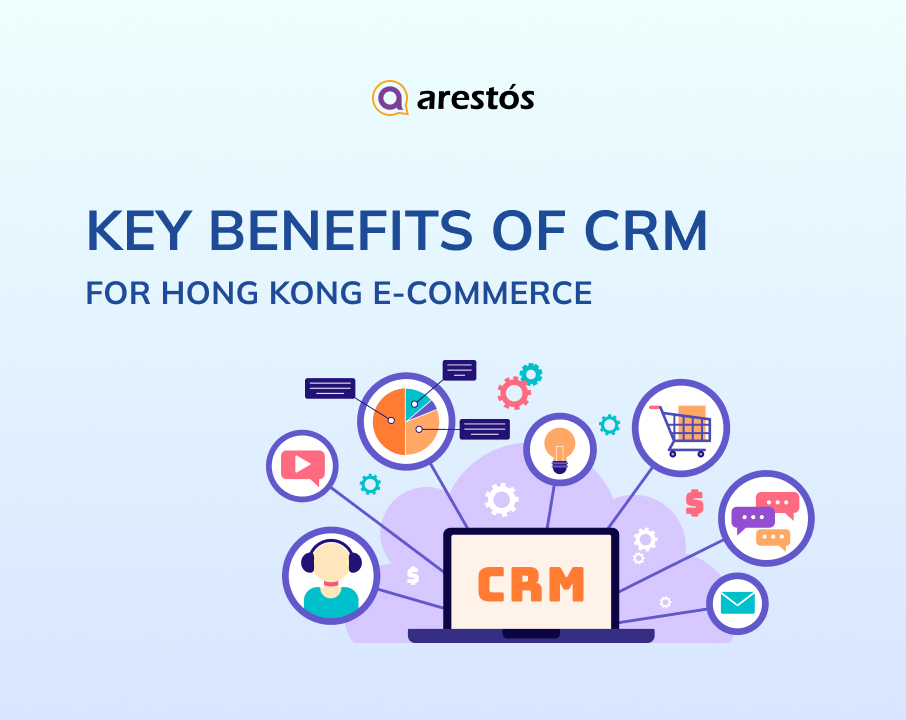Back to featured insights
5 Key Benefits of CRM for Hong Kong E-Commerce Businesses
CRM plays a critical role in helping Hong Kong e-commerce businesses manage customer data, streamline operations, and scale efficiently. This guide highlights five key benefits of CRM and introduces top CRM solutions designed to support omnichannel selling, local payments, and sustainable growth.
Table of Content
Share
A CRM for Hong Kong E-Commerce Businesses helps online retailers manage customer data, sales activities, and omnichannel interactions in Hong Kong’s highly competitive digital market. The key benefits of using a CRM include improved marketing performance, better data sharing across teams, and more efficient customer management.
This content is designed for Hong Kong-based online stores, DTC brands, and e-commerce businesses looking to scale their operations. In this guide, we present the five key benefits of CRM and highlight the best CRM for a Hong Kong e-commerce business.
What is a CRM for e-commerce?
A CRM for e-commerce (Customer Relationship Management) is a software system used to store, organize, and manage customer data generated from online shopping activities. It centralizes information such as customer profiles, contact details, purchase history, order records, and interaction logs into a single platform.
Unlike traditional CRM systems that primarily support offline or sales-driven businesses, an e-commerce CRM is designed to integrate directly with online stores and digital channels, allowing customer data to be automatically updated based on real-time actions such as browsing, ordering, and post-purchase communication.
For WooCommerce-based stores, you can also explore the best CRM plugins to level up your WooCommerce store and see plugin CRM solutions designed specifically for WooCommerce.
5 key benefits of CRM for a Hong Kong e-commerce business
In Hong Kong’s highly competitive e-commerce market, a CRM helps online businesses manage customers, data, and operations more effectively. Below are five key benefits of using a CRM for a Hong Kong e-commerce business.
- Optimize Marketing Performance
- Sharing Data with All Stakeholders
- More productive customer care
- Complete Payment Data
- Monitor Order Management in One Place
Below is a breakdown of each key benefit and how it directly supports Hong Kong e-commerce operations.
Optimize Marketing Performance
A CRM helps e-commerce businesses improve marketing effectiveness by using customer data to plan, execute, and measure campaigns more accurately.
- Centralizes customer data from website visits, orders, and campaigns
- Enables precise customer segmentation based on behavior and purchase history
- Supports targeted marketing across email, SMS, and messaging channels
- Improves campaign performance tracking and ROI measurement
Sharing Data with All Stakeholders
A CRM ensures that all departments access the same customer and business data, enabling better coordination and decision-making.
- Stores sales, marketing, customer, and order data in one unified system
- Allows teams to access real-time, up-to-date customer information
- Reduces data silos between departments
- Improves collaboration between marketing, sales, and customer support teams
More productive customer care
CRM systems help customer service teams handle inquiries more efficiently by providing full visibility into customer history.
- Provides a complete view of customer profiles and interaction history
- Helps support agents respond faster and more accurately
- Ensures consistent customer service across multiple communication channels
- Reduces resolution time for inquiries and complaints
Complete Payment Data
An e-commerce CRM consolidates payment-related information, giving businesses better control over transactions and financial records.
- Consolidates payment methods, transaction status, and refund records
- Supports multi-currency and multiple payment options in one dashboard
- Improves visibility into revenue and payment behavior
- Simplifies financial reporting and reconciliation
Monitor Order Management in One Place
By centralizing order information, a CRM allows businesses to manage and track the entire order lifecycle from one platform.
- Centralizes order status, fulfillment, and delivery information
- Integrates with e-commerce platforms and logistics systems
- Helps teams quickly track and resolve order-related issues
- Improves order processing efficiency and customer communication
How we selected the best CRM for Hong Kong e-commerce websites
In Hong Kong’s fast-moving and highly competitive e-commerce market, selecting the right CRM requires a strong focus on localization, operational efficiency, and scalability to support omnichannel selling and sustainable growth.
- Localization and bilingual support: CRM platforms were selected based on their ability to support both Traditional Chinese and English, ensuring smooth internal workflows and consistent customer communication.
- Omnichannel messaging readiness: Priority was given to CRMs that integrate with WhatsApp, Facebook, Instagram, and WeChat, allowing businesses to manage all customer conversations from one place.
- E-commerce platform compatibility: Chosen systems offer reliable integration with Shopify, Shopline, and WooCommerce to keep customer and order data synchronized in real time.
- Local payment and multi-currency handling: CRMs were evaluated on their ability to manage Hong Kong payment methods and multiple currencies with clear transaction visibility.
- Automation for marketing and customer engagement: Platforms with built-in automation were favored to support follow-ups, segmentation, and scalable customer journeys.
- Scalability for high-volume operations: Selected CRMs can handle increasing order volumes and customer data, especially during peak shopping periods.
- Data security and PDPO compliance: Compliance with Hong Kong’s Personal Data (Privacy) Ordinance and strong data protection features were essential criteria.
- Local support and implementation ecosystem: Preference was given to CRM solutions with regional support teams or Hong Kong-based implementation partners.
10 Best CRM for Hong Kong E-Commerce Websites
Odoo CRM – All-in-One CRM for Hong Kong E-Commerce Operations
Odoo CRM is part of the Odoo all-in-one business management platform, combining CRM with e-commerce, inventory, accounting, and marketing tools. It is well-suited for Hong Kong e-commerce businesses looking for a unified system to manage both customer relationships and back-office operations.
Key Features
- Integrated CRM and e-commerce: Seamlessly connects customer data with online store, orders, and sales pipelines
- Modular system: Businesses can activate only the apps they need, including CRM, Website, Inventory, and Accounting
- Multi-currency and tax handling: Supports HKD and cross-border transactions commonly used by Hong Kong sellers
- Customizable workflows: Flexible pipelines and automation for sales follow-ups and lead management
- Scalable architecture: Suitable for SMEs and growing omnichannel e-commerce businesses
Implement Odoo CRM for e-commerce with Arestós to unify sales, operations, and customer data on one scalable platform.
Salesforce CRM – Best for Large Hong Kong E-Commerce Enterprises
Salesforce CRM is an enterprise-grade platform trusted by global brands. It offers powerful tools to manage customer data, automate workflows, and create personalized customer experiences across all touchpoints.
Key Features
- Sales Cloud & Service Cloud: Unified customer records for sales and support teams
- Advanced automation: Custom workflows, rule-based triggers, and AI insights
- Integration ecosystem: Works with Shopify, payment gateways, and third-party apps
- Scalability: Handles high data volumes and complex multi-team processes
HubSpot CRM – Best CRM for Growing Hong Kong Online Stores
HubSpot CRM is a beginner-friendly yet powerful platform that combines sales, marketing, and customer service tools. It is ideal for growing e-commerce merchants in Hong Kong who need automation without complexity.
Key Features
- Built-in marketing automation: Email nurturing, segmentation, and workflows
- Sales pipeline tracking: Visual deals board for easy sales management
- E-commerce integrations: Works with Shopify and major online storefronts
- Reporting dashboards: Real-time insights into customer behavior
Zoho CRM – Cost-Effective CRM for Hong Kong SMEs
Zoho CRM is a flexible CRM with affordable pricing tiers, making it a popular choice for small and medium e-commerce businesses. It supports custom controls and local language options.
Key Features
- Custom modules & workflows: Tailor to specific business needs
- Multi-language support: Traditional Chinese + English
- Lead scoring & automation: Efficient customer prioritization
- Integration with Zoho Suite: Sync with Zoho Books, Inventory, and more
Freshsales CRM – Omnichannel CRM for Hong Kong Retail Brands
Freshsales (by Freshworks) delivers a balanced mix of CRM and engagement tools. It is suitable for retail brands that want simple automation with integrated communication channels.
Key Features
- Lead & deal management: Clear pipeline views
- Built-in chat & email integration: Centralized communication tools
- AI-based lead scoring: Predictive insights for sales focus
- Omnichannel support: Phone, chat, email, social interactions
Zendesk CRM – Best for Customer Support-Driven E-Commerce in Hong Kong
Zendesk CRM is built around robust customer support and ticketing features, making it ideal for e-commerce brands with high customer service demands.
Key Features
- Ticketing & case management: Track and prioritize customer requests
- Unified customer profiles: Support history with CRM data
- Self-service portal: Help center articles and knowledge base
- Multi-channel support: Email, chat, phone, and social messaging
Kommo (amoCRM) – Best CRM for WhatsApp & Messaging Commerce in Hong Kong
Kommo (formerly amoCRM) specializes in messaging-driven sales workflows, ideal for Hong Kong merchants where WhatsApp commerce and social messaging are key sales channels.
Key Features
- WhatsApp & social integration: Central inbox for all messaging apps
- Conversational sales pipeline: Track deals through chats
- Automation templates: Quick replies and follow-ups
- Real-time engagement analytics: Measure response and conversion rates
Pipedrive CRM – Simple Sales CRM for Hong Kong Online Merchants
Pipedrive is a sales-focused CRM known for its intuitive interface and visual deal pipeline. It is best for merchants who prioritize structured sales processes.
Key Features
- Visual sales pipeline: Easy drag-and-drop deal stages
- Activity reminders: Keeps sales tasks on track
- Integration marketplace: Connect email, calendars, e-commerce apps
- Customizable fields: Tailor CRM to niche workflows
Creatio CRM – Highly Customizable CRM for Hong Kong Omnichannel Retail
Creatio is a process-driven CRM platform designed for businesses that need deep customization and omnichannel orchestration.
Key Features
- Process library & templates: Pre-built workflows for retail
- Omnichannel customer journeys: Unified interactions across channels
- Low-code customization: Build custom apps and processes
- Customer analytics dashboards: Insights for strategic decision-making
Pepper Cloud CRM – Hong Kong-Focused CRM for Local SMEs
Pepper Cloud CRM is tailored for the Hong Kong market, with features designed for local business practices and regional payment/logistics integrations.
Key Features
- Localization ready: Traditional Chinese + English support
- SME-friendly dashboard: Easy index of sales, orders, and customers
- Regional payment integration: Works with local gateways such as FPS and AlipayHK
- Support ecosystem: Local partners for setup and training
CRM Pricing Considerations for Hong Kong Online Stores
When choosing a CRM for an online store in Hong Kong, pricing should be evaluated beyond the initial subscription cost. Businesses need to consider scalability, localization requirements, and long-term operational expenses to ensure the CRM delivers sustainable value.
- Pricing models and user-based fees: Many CRM platforms charge per user per month, which can significantly impact costs as sales, marketing, and customer service teams grow.
- Feature-based plan limitations: Lower-tier plans often restrict automation, reporting, or omnichannel features that are essential for e-commerce operations.
- Integration and add-on costs: Connecting the CRM with e-commerce platforms, payment gateways, or messaging tools may require paid add-ons or third-party integrations.
- Localization and language support: CRMs offering Traditional Chinese interfaces or Hong Kong-specific configurations may come at a higher cost but reduce operational friction.
- Implementation and onboarding expenses: Enterprise or highly customizable CRMs often involve setup fees, consulting services, or partner implementation costs.
- Scalability and long-term cost growth: As order volumes and customer databases expand, businesses should assess how pricing increases over time.
- Local support and service fees: CRM vendors with Hong Kong-based support teams or partners may include additional service or maintenance charges.
Frequently Asked Questions
1. What type of CRM is best for Hong Kong e-commerce businesses?
The best CRM for Hong Kong e-commerce businesses is one that supports omnichannel communication, integrates with popular e-commerce platforms, and offers bilingual interfaces in Traditional Chinese and English.
2. Do Hong Kong online stores need CRM systems with local payment integrations?
Yes. CRM systems that can integrate with local payment methods such as AlipayHK, FPS, and Apple Pay help businesses manage transactions more efficiently and maintain accurate customer and payment records.
3. Is a global CRM or a local Hong Kong CRM better for e-commerce?
Global CRMs offer scalability and advanced features, while local Hong Kong CRMs provide stronger localization and regional support. The right choice depends on business size, budget, and operational complexity.
4. Can small e-commerce businesses in Hong Kong use CRM software effectively?
Absolutely. Many CRM platforms offer affordable plans and essential features suitable for SMEs, allowing small online stores to manage customer data and sales processes efficiently.
Conclusion
CRM plays a critical role in helping Hong Kong e-commerce businesses manage customer data, streamline operations, and support sustainable growth in a highly competitive market. By understanding the key benefits of CRM, online retailers can better align their sales, marketing, and customer service efforts while building stronger long-term customer relationships.
At Arestós, we help e-commerce businesses design, optimize, and scale their digital commerce ecosystems. Our e-commerce services focus on building high-performing online stores, integrating CRM and third-party systems, and supporting omnichannel strategies tailored to the Hong Kong market.
Contact us to explore e-commerce solutions tailored to help Hong Kong online businesses grow and scale effectively.
Subscribe to our newsletter!
Get updated to
the lastest IT trends














